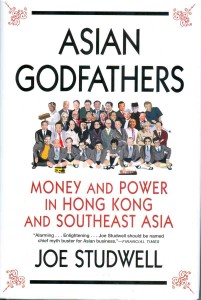 For those of us who frequently travel to and do business in Asia, it becomes increasingly important to understand who the major players in the business world are, and how they have traditionally operated. Two books we here at WoWasis have reported on before are Martin Booth’s The Dragon Syndicates: The Global Phenomenon of the Triads, and Vichai Suwanban’s classic, Big Business in Thailand. To this important list, we’ll add Joe Studwell’s Asian Godfathers: Money and Power in Hong Kong and Southeast Asia (2007, ISBN-13: 978-0-87113-968-9). Studwell is a reporter who’s been working the Asian beat since 1991, has a keen eye for detail, and a veteran reporter’s curiosity.
For those of us who frequently travel to and do business in Asia, it becomes increasingly important to understand who the major players in the business world are, and how they have traditionally operated. Two books we here at WoWasis have reported on before are Martin Booth’s The Dragon Syndicates: The Global Phenomenon of the Triads, and Vichai Suwanban’s classic, Big Business in Thailand. To this important list, we’ll add Joe Studwell’s Asian Godfathers: Money and Power in Hong Kong and Southeast Asia (2007, ISBN-13: 978-0-87113-968-9). Studwell is a reporter who’s been working the Asian beat since 1991, has a keen eye for detail, and a veteran reporter’s curiosity.
Studwell here relates the histories of 88 families and individuals that have profited enormously since the end of the Pacific war, encompassing the countries of Hong Kong, Indonesia, Macau, Malaysia, The Philippines, Singapore, and Thailand. The reach of these families is extensive, crossing over borders to align with other factions, and pervasive, affecting politics and governmental decisions in every country. We’ve often said that “truth” is a western construct, and the book underscores that “corruption” may very well operate under the same classification. With these families and individuals, everything goes into the same bin as “business as usual.” We also we be remiss if we didn’t use the word “dangerous.” Individuals and families as powerful as these routinely buy justice, and while this is not a book on crime per se, crossing these people while involved in any business dealing could be hazardous, financially or otherwise.
There are scores of fascinating stories in this 328 page book, well-indexed for those who missed something along the way. We found ourselves reverting to it dozens of times. Highlights are many, and will vary according to the interest and country-focus of the reader. Those following the news stories involving the distribution of assets from Macau gambling magnate Stanley Ho’s empire will note that the complexity involves 17 acknowledged children, never mind the reported dozens of others lurking in the background.
Among the more fascinating items in the book are related to financial matters in post WWII Hong Kong:
It was the educated, the well-heeled and the cosmopolitan who profited most readily from war. In Hong Kong members of the local Chinese elite made fortunes buying up ‘duress notes’ – Hong Kong dollars issued by local bankers under Japanese direction – just before the British resumed power. The notes were purchased at a fraction of their face value in the expectation that the returning colonial power could be persuaded to honour the currency as a means to restore ‘economic stability’. In 1946, this turned out to be the case. The Hongkong Bank bought HK$119 million of duress notes at their full face value. One of the prime beneficiaries was said to be Sir Sik-nin Chau, a London- and Vienna-trained surgeon and businessman and son of Sir Shouson Chow, who had been the first Chinese appointed to Hong Kong’s Executive Council.”
Some of the best parts of the book are subtle indicators of practices that are still in wide use today. The Chinese “credit ticket” system described on page 7 relates how immigrants travel to other countries for work by becoming indebted to employers in return for their passage, a business practice popular still, particularly in the western hemisphere, in countries ranging from Canada to Argentina. Those flying on Cathay Pacific will have noted the Swire logo on airplane fuselages, and the author includes the Swire domain in his list of power brokers. We weren’t aware of Malaysian godfather Ananda Krishnan until we read this book, but his story is among the most compelling, detailing what began as his off-track betting empire and morphed into projects such the 88-story Petronas Tower in Kuala Lumpur.
The book is essential reading for anyone doing business in much of Asia, providing a detailed history of how things get accomplished, with tendrils reaching to major players and governmental bodies. It also is an important historical document that will fascinate anyone curious about the nature of big business in Asia. Buy it here at the WoWasis eStore.
Leave a Reply